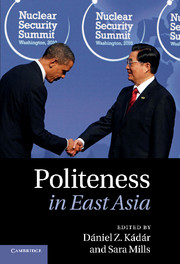Book contents
- Frontmatter
- Contents
- Notes on contributors
- Foreword
- Acknowledgements
- Abbreviations
- 1 Introduction
- Part I Politeness in East Asia: Theory
- 2 Politeness and culture
- 3 Honorifics: The cultural specificity of a universal mechanism in Japanese
- 4 Methodological issues in East Asian politeness research
- 5 Intercultural communication and East Asian politeness
- Part II Politeness in East Asia: Practice
- Notes
- Bibliography
- Index
2 - Politeness and culture
from Part I - Politeness in East Asia: Theory
Published online by Cambridge University Press: 07 September 2011
- Frontmatter
- Contents
- Notes on contributors
- Foreword
- Acknowledgements
- Abbreviations
- 1 Introduction
- Part I Politeness in East Asia: Theory
- 2 Politeness and culture
- 3 Honorifics: The cultural specificity of a universal mechanism in Japanese
- 4 Methodological issues in East Asian politeness research
- 5 Intercultural communication and East Asian politeness
- Part II Politeness in East Asia: Practice
- Notes
- Bibliography
- Index
Summary
The aim of this chapter is to analyse the complex relations between politeness, impoliteness and culture, in order to argue that we need to develop new models for analysing politeness at the level of culture. We argue that cultures are not homogeneous and that within each culture there are different views on what constitutes polite and impolite behaviour; therefore, if we use models of politeness which ignore the heterogeneous nature of politeness and impoliteness, those generalisations about cultures will be of limited value. They can only tell us about the dominant politeness norms and do not reflect the variety of norms and disagreements about politeness and impoliteness which characterise linguistic behaviour within any culture.
Many theorists of politeness assume that it is possible to generalise about the politeness and impoliteness norms of particular language groups, for example, Japanese or Greek (Sifianou, 1992). In order to make statements about the language use of a particular culture, most theorists ignore the fact that politeness and impoliteness norms are, by their very nature, contested. As Eelen (2001) argues, politeness is a question of evaluation; those evaluations emanate from groups of people or communities of practice. Therefore, no culture will unequivocally hold to a set of norms for what counts as polite or impolite behaviour. There may be trends within particular groups, but even within particular groups there will be conflict over what constitutes politeness and impoliteness. Thus, we argue that politeness theorists who analyse the politeness norms of particular cultures or who discuss inter- or intra-cultural politeness and impoliteness should develop new ways of discussing the language behaviour of cultures as a whole. These new models of the linguistic behaviour of cultures must involve description of conflicts over appropriateness and clashes over what constitutes politeness and impoliteness.
- Type
- Chapter
- Information
- Politeness in East Asia , pp. 21 - 44Publisher: Cambridge University PressPrint publication year: 2011
- 38
- Cited by

